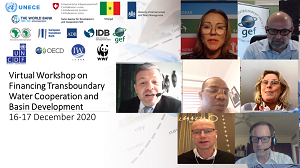While transboundary rivers, lakes and aquifers, accounting for 60 per cent of global freshwater flows, are of crucial importance for the sustainable development and political stability of riparian States, the financial means for their management, development and protection are insufficient in most parts of the world. This negatively affects more than 40 per cent of the world’s population, who live within or rely on the more than 300 transboundary basins on our planet, and delays achievement of Sustainable Development Goal 6 on clean water and sanitation. This lack of funding could compromise the sustainability of cooperation, affect the development of shared basins and limit the prevention of tensions over shared water resources. The Covid-19 pandemic can further complicate funding of transboundary water cooperation, but the Covid-19 recovery may also bring some new opportunities.
These were some of the messages of the virtual workshop on financing transboundary water cooperation, organized on 16 and 17 December 2020 by the Convention on the Protection and Use of Transboundary Watercourses and International Lakes (Water Convention) serviced by UNECE, in cooperation with numerous partners, namely the African Development Bank, the Asian Development Bank, the European Investment Bank, the Global Environment Facility (GEF) and its International Waters Learning Exchange and Resource Network, the Inter-American Development Bank, the Netherlands, the Organization for Economic Cooperation and Development, Senegal, Switzerland, the United Nations Capital Development Fund, the World Wildlife Fund and the World Bank. The workshop built on the findings of a background study on financing transboundary water cooperation and basin development and drew together experience from all regions on that topic, bringing together more than 200 participants from countries, river basin organizations, international organizations, international financial institutions, private sector, civil society, academia and others.
“The funding gap for water can only be addressed by governments, financial institutions and the private sector together, said Ms. Olga Algayerova, the UNECE Executive Secretary. I very much hope that this workshop will strengthen the dialogue between basin managers, developers and representatives of the financial sector – both public and private”.
Mr. Carlos Manuel Rodriguez, CEO and Chairperson of the Global Environment Facility, insisted on the need to accelerate actions to support transboundary water management, and confirmed that the GEF would continue its support in this field.
Diversifying funding sources to fit the needs: increasing traditional domestic budgetary resources for cooperation and looking beyond
While various funding sources can be mobilized to meet cooperation financial needs; traditionally, public funding represents the major source of funds for transboundary water cooperation and basin development. Since national ownership is crucial, direct Member States contributions are and should remain the primary financial source to support joint bodies core costs.
As highlighted by Jennifer Sara, Global Director of the World Banks’s Water Global Practice, the only way to achieve “A Water-Secure World for All” is to pursue transboundary water cooperation, and this would require cultivating and expanding the partnership with the civil society and the private sector. So far, private funding remains mostly limited to revenue-generating activities or projects (mostly infrastructure projects), due to the perceived risk associated with the complexity of a multi-stakeholder environment existing in shared basin. While companies and investors are gradually getting more aware that water risks can negatively affect their business and start investing billions in mitigating such risks (CDP2020), more needs to be done to increase their understanding of transboundary issues and to integrate transboundary water information into risk assessment tools.
Exploring emerging innovative financing mechanisms and blended finance to finance transboundary water projects
Many public-private partnerships around the world have effectively employed the concept of “blended finance”, using public funding in conjunction with private financing. They can also be used in a transboundary context, as for the Nam Theun 2 Hydropower Project in Laos, part of the Mekong River basin, but require an adequate legal, regulatory and institutional environment. In addition, innovative financial mechanisms, including water funds, green bonds and social impact bonds, are being developed, such as the Blue Peace Financing mechanism being tested by the Gambia River Basin Development Organization.
Improving the sustainability of financial support for transboundary water cooperation and basin development also requires further experience-sharing between basins and bringing together the water and financing communities. Mr. Simon Zbinden, Head of the Global Programme Water at the Swiss Agency for Development and Cooperation, stressed the usefulness of the platform offered by the Water Convention to further advance collaboration and exchanges on the topic of financing transboundary water cooperation.
Finally, Mr. Henk Ovink, Special Envoy for International Water Affairs for the Netherlands, stressed “the importance to advance this partnership and also scale up the promising best practices. The longer-term sustainability and resiliency perspective, aimed at addressing all water’s values, is of critical importance to help progress the needed investments. It takes millions to spend these billions wisely, by investing in people, the institutions and their transboundary partnerships and programs.”
More information on the workshop, the background study and presentations are available at https://unece.org/environmental-policy/water/events/virtual-workshop-financing-transboundary-water-cooperation-and-basin.


